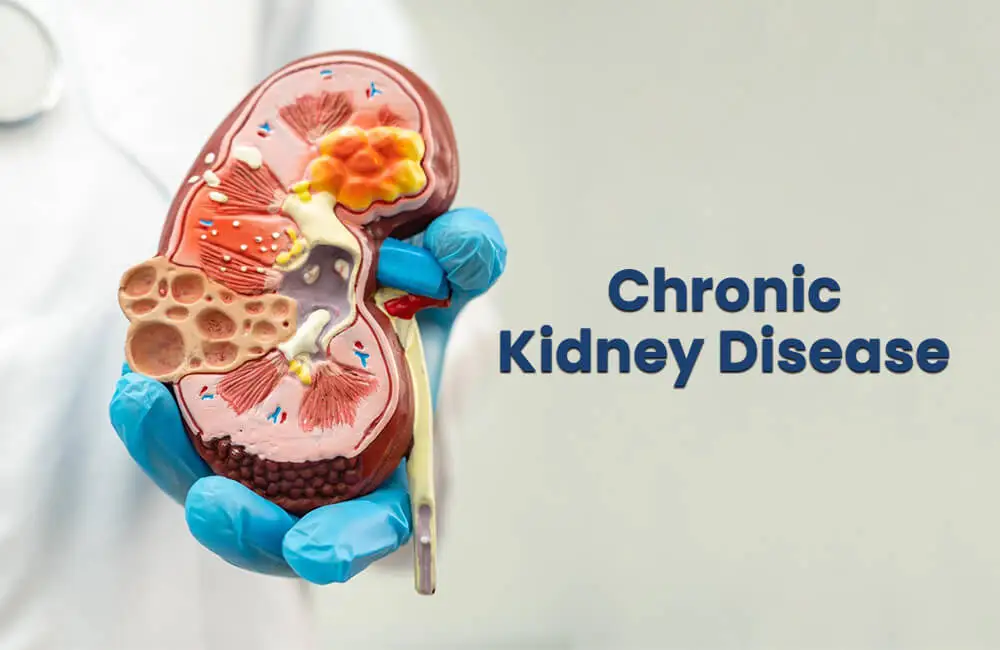
Chronic Kidney Disease

Chronic Kidney Disease (CKD) is a progressive condition in which the kidneys gradually lose function over time, affecting their ability to filter blood and remove waste from the body. As kidney function declines, waste builds up, leading to health complications. With early diagnosis and effective management, the progression of CKD can be slowed, enhancing quality of life and overall well-being.
Dr. Nageswara Reddy and his team specialize in providing personalized treatment plans for CKD, focusing on managing symptoms, delaying disease progression, and improving patient health outcomes. Whether you’re in the early or advanced stages of CKD, our clinic offers a comprehensive approach tailored to your needs.
Signs & Symptoms of Chronic Kidney Disease
Chronic Kidney Disease often progresses slowly, and symptoms may not appear until the later stages. However, being aware of potential signs can lead to early detection and better management. Common symptoms include:
- Fatigue and weakness
- Swelling in the legs, ankles, or feet (edema)
- Frequent or reduced urination
- Shortness of breath, especially during physical activities
- High blood pressure that’s difficult to control
- Nausea and vomiting
- Loss of appetite or taste changes
- Difficulty concentrating or memory issues
- Muscle cramps, particularly in the legs
If you experience any of these symptoms, consulting a nephrologist like Dr. Nageswara Reddy can help determine the underlying cause and start a treatment plan.
Causes of Chronic Kidney Disease
CKD can result from various underlying health issues that damage the kidneys over time. The most common causes include:
- Diabetes: High blood sugar levels can damage blood vessels in the kidneys, leading to CKD.
- High Blood Pressure: Elevated blood pressure puts strain on the kidneys and their blood vessels, increasing the risk of damage.
- Glomerulonephritis: Inflammation of the kidney’s filtering units (glomeruli) can impair function.
- Recurrent Kidney Infections: Frequent kidney infections (pyelonephritis) can cause scarring and damage over time.
- Other Factors: Family history of kidney disease, certain medications, and lifestyle choices, such as smoking and poor diet, may also contribute to CKD.
Understanding the cause of CKD is essential for effective treatment and prevention of further damage.
Treatment Options for Chronic Kidney Disease
The treatment of CKD aims to manage symptoms, slow progression, and maintain quality of life. Dr. Nageswara Reddy’s approach involves a personalized treatment plan, which may include:
- Medication Management: Medications are often prescribed to control blood pressure, manage blood sugar levels, and address symptoms like swelling or anemia.
- Dietary Modifications: A kidney-friendly diet is crucial for CKD patients, focusing on reducing sodium, protein, and phosphorus intake to ease kidney strain.
- Lifestyle Changes: Regular exercise, smoking cessation, and weight management are essential lifestyle changes to support kidney health.
- Dialysis (if required): For advanced stages of CKD, dialysis may be recommended to assist with blood filtration when the kidneys can no longer perform adequately.
- Regular Monitoring: Routine check-ups to monitor kidney function and adjust treatment as necessary are an integral part of CKD management.
With proactive management and personalized care, patients with CKD can lead fulfilling lives. Dr. Nageswara Reddy’s expertise and comprehensive treatment approach provide the support needed at each stage of the journey.
- Kidney Stones
- Hypertension
- Kidney Cysts
- Kidney Infection
- Glomerulonephritis


